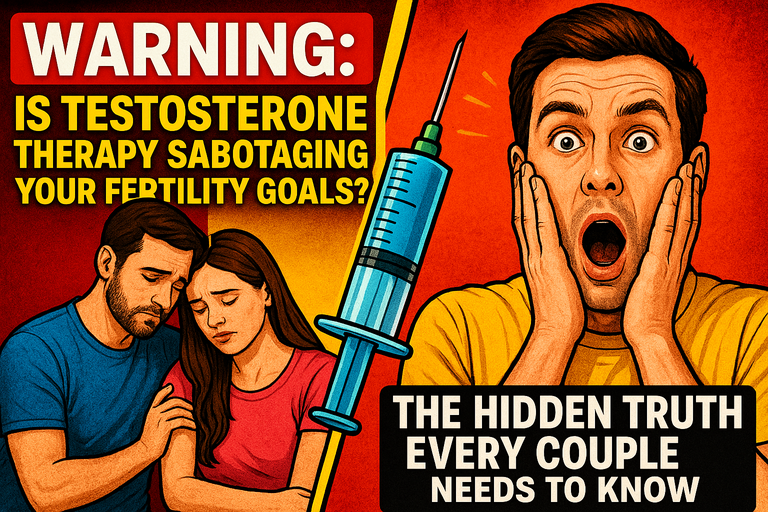Imagine this: You're struggling with low testosterone levels, a common issue that can impact everything from energy to fertility. You’re feeling frustrated, maybe even hopeless, searching for solutions that actually work. What if the answer isn’t a traditional testosterone replacement therapy but a diabetes medication you’ve probably never considered? Intrigued? You should be.
Recent research revealed by Gizmodo in the eye-opening article Need a Testosterone Boost? Maybe Try Some Ozempic uncovers a surprising side effect of GLP-1 receptor agonists like Ozempic — a notable increase in testosterone levels in men taking the drug for obesity or type 2 diabetes. This discovery is shaking up the medical world and, more importantly, could have huge implications for men facing fertility challenges.
Why Does Testosterone Matter for Fertility?
Testosterone is more than just the hormone that fuels muscle growth and libido. It plays a critical role in sperm production and overall male reproductive health. Low testosterone can lead to decreased sperm count, impaired sperm motility, and ultimately, difficulty conceiving.
For couples trying to conceive naturally, these challenges can be heartbreaking. Traditional approaches often involve hormone therapy or assisted reproductive technologies, which may be costly and emotionally taxing.
The Ozempic Connection: What’s Going On?
Ozempic, primarily prescribed for weight management and diabetes, works by mimicking the GLP-1 hormone, which helps regulate blood sugar and appetite. The new research suggests an unexpected hormonal ripple effect: improved testosterone levels among men using it.
This begs an important question: Could managing metabolic health with medications like Ozempic indirectly enhance male fertility?
Putting It in Context: Holistic Male Fertility Health
While the medical findings are promising, it's essential not to rush into using Ozempic as a fertility treatment without consulting healthcare professionals. Nonetheless, it opens an exciting conversation around the intersection of metabolic health and reproductive wellness.
Men looking to improve fertility can benefit immensely from a holistic approach that combines medical insights with lifestyle and environmental adjustments:
- Maintain a healthy weight: Obesity can dampen testosterone and sperm quality.
- Manage blood sugar levels: Diabetes and insulin resistance negatively affect reproductive hormones.
- Incorporate nutrient-rich diets: Foods rich in zinc, selenium, and antioxidants support sperm health.
- Reduce stress: Chronic stress can lower testosterone.
- Consider at-home fertility support: For couples exploring conception, tools like MakeAMom’s home insemination kits provide discreet, cost-effective options tailored to different fertility needs, whether dealing with sperm motility or other challenges.
Why Home Fertility Solutions Matter More Than Ever
While breakthrough research like this unfolds, many couples continue their journey at home, seeking affordable, accessible methods to conceive. MakeAMom’s range of reusable insemination kits, including specialized options for low motility or sensitivity issues, empowers users to take control in a private, stress-minimized environment.
This combination—advancements in understanding male hormonal health and innovative home-based tools—can redefine fertility journeys in 2025 and beyond.
What Should You Do Next?
If you or your partner are coping with low testosterone or fertility concerns, take a proactive approach:
- Consult your healthcare provider: Discuss how metabolic conditions might be impacting your reproductive health and whether medications like Ozempic are appropriate.
- Explore lifestyle changes: Small, consistent improvements in diet, exercise, and stress management can elevate hormone balance.
- Consider at-home support: Learn about non-clinical options like MakeAMom's kits that offer practical fertility solutions in your own space.
Final Thoughts
Science is constantly evolving, and sometimes the most unexpected discoveries—like Ozempic's testosterone-boosting side effect—can open doors to new fertility possibilities. For men, this means hope on the horizon through improved hormonal health, while couples worldwide can find empowerment in combining medical insights with innovative home conception tools.
So, what’s your take? Could managing your metabolic health be the game-changer your fertility journey needs? Dive deeper, stay informed, and remember: every step forward counts.
Feel inspired? Share your thoughts and experiences in the comments below! Your story could be the spark someone else needs.
